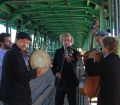EUROPEAN VOICES IV
Concert: Instrumental Ensembles from Central and Central Eastern Europe
Sunday, 29 November 2015, 19:00
University of Music and Performing Arts Vienna, Haydn-Saal
Anton von Webern Platz 1, 1030 Wien.
Admission free.
(© Christoph Huber)
Viennese Schrammel music, Austrian-Alpine folk music
An ensemble brought together and led by Theresa Aigner: Theresa Aigner (violin), Irma Maria Troy (violin), Abigail Wagner (viola), Daniela Mayrlechner (fife), Marie-Theres Stickler (accordion, concertina), Andrea Wild (contra guitar), Sandra Zöchbauer (clarinet), Hermann Härtel (Hackbrett), Johannes Eder (Baßgeige)
The smallest complete line-up for “typical Austrian” country music (Landmusik) consists of two melody instruments and a bass. The line-up expanded in the 19th century due to the increasing size of the repertoires and the extension of the genre. This extension was completed by the Hackbrett as a ‘filling’ and supporting part as well as the diatonic accordion, which unites melody and bass in one instrument, thus creating a stronger effect. The viola is utilized as a rhythmic accompanying instrument. The programme will be completed by the so called Altsteirer Trio line-up as well as by the line-up from the cover image of the folder for the symposium.
In Viennese music (Wiener Musik), the bass and the Nachschlag (a note played or sung at the end of the note to which it serves as an ornament) are combined through the use of the contra guitar. A pecularity of this line-up, the clarinet in high register reinforcing the melody, is replaced by the chromatic Viennese accordion (Wiener Knopferlharmonika). The programme will include works of the best-known musician of this genre, Johann Schrammel, who is at the same time its eponym, as well as other well-known dance violinists of the time.
- Schrammelquartett. Johann Schrammel: Marsch "Kunst und Natur". Live-Aufnahme. Juni 2015.
Romanian music from Transylvania: Razvan Rosu and the ensemble Nepoţii Iancului
The three musicians come from Satu Mare in Transylvania, Romania. Răzvan Roşu is currently completing a master’s degree in Southeast-European studies in Jena and a PhD in anthropology in Cluj. At the same time he performs regularly in numerous European countries on flutes, bagpipes and the tulnic (Alphorn) from Țara Moților in the Apuseni mountains in Transylvania, and sings traditional songs from the region.
Petrică Zele studied the violin in Cluj. His interest in folk music was aroused early on by the tradition of this music in his family. His father is also a violinist.
Bogdan Roşu, the brother of Răzvan Roşu, is still at school. He loves to play folk music and jazz and tries to connect these two worlds with each other.
The programme of the group contains instrumental dance music, tulnic signals, songs about World War I, about Emperor Franz Joseph, sad songs as well as dance songs. They will be accompanied by traditional dances.
Janusz Prusinowski Kompania
The Janusz Prusinowski Kompania is a group of musicians and dancers who are fascinated by village traditions. After years of playing with friends on people’s doorsteps and being apprenticed by village music masters, they began to spread their love of mazurkas, polkas, wiwats and other forms of Polish folk music to various European countries, the USA and other parts of the world.
Dance music is at the heart of the reperertoire of this group. Currently they are promoting their latest album, entitled Knee-deep in Heaven, which tries to put its listeners in precisely this position.
- Serce
- Wiwat Halina!









